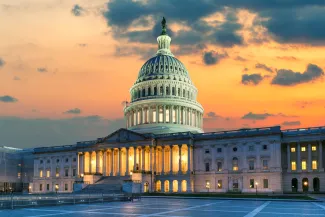
New expansion of Child Tax Credit advances in Congress
Click play to listen to a version of this article.
(Wisconsin News Connection) Tax-filing season is underway, and Congress is one step closer to helping low-income families get a bigger break on their returns. Policy experts say a new expansion of the Child Tax Credit would address poverty across the country.
Late this week, the U.S. House passed a bipartisan tax bill that includes a three-year expansion of the Child Tax Credit. Analysts have said it isn't as robust as the one-year expansion from 2021, but a key provision would allow families with little or no income to gain eligibility.

Tim Smeeding, a retired professor of public affairs and economics at the University of Wisconsin, said it could allow struggling households to address a big expense they haven't been able to cover.
"You can pay heating bills that you've let go because you know that the utility won't shut you off until you get the tax refund," he said.
Smeeding, who formerly directed the Institute for Research on Poverty, said eliminating those debts frees up money for families to spend on children's needs.
Unlike the previous expansion, there would not be monthly payments. It only would apply to a family's income-tax refund. The compromise measure also includes business tax breaks. Despite bipartisan support in the House, the bill faces an uncertain future in the Senate, with pushback from both Republicans and Democrats.
The Center on Budget and Policy Priorities estimates that in the first year, expanding the Child Tax Credit would lift as many as 400,000 kids above the poverty line.
While there are calls to bring back the original expansion, Kris Cox, the center's deputy director for federal tax policy, said this bill would still make a difference.
"Half of kids who don't get the full credit now, their families will gain $600 or more from the bill," she said, "and about 40% of kids who don't get the full credit now, their families will gain $1,000 or more from this bill."
Bill sponsors hope to get final approval so qualifying households could claim the credit on this year's taxes. Cox said if you file earlier, the measure instructs the Internal Revenue Service o "make good" on your return.
Wisconsin has an Earned Income Tax Credit, but the state is often cited as having a regressive tax structure that hurts low-income households. Experts have said the federal plan would help ease that burden.

















